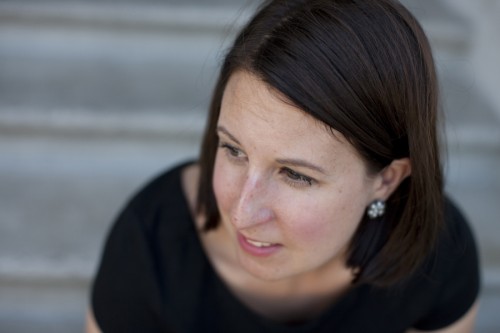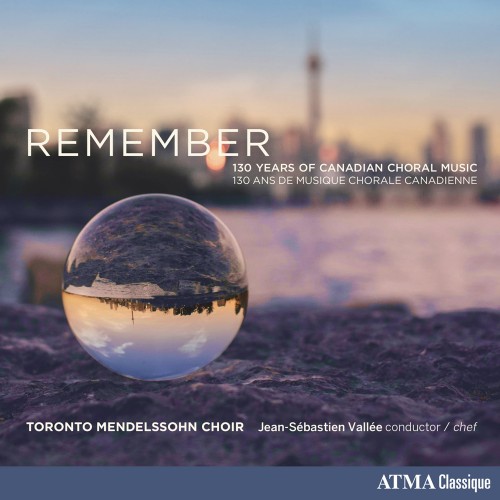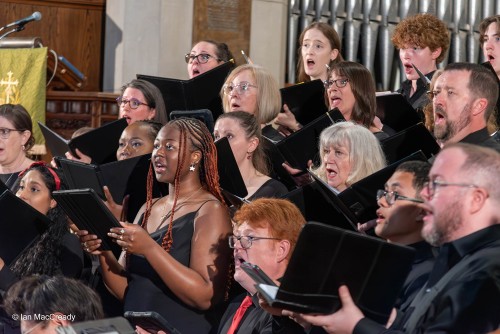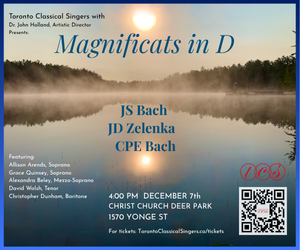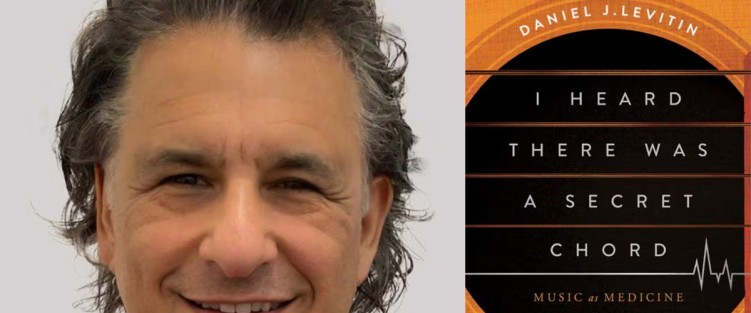 Renowned neuroscientist Daniel J. Levitin paused as he sang the word “strings” and looked over the neck of his guitar to the audience in the University of Toronto’s Desautels Hall. The air felt charged. Instinctively, we knew what he wanted. For a brief moment, many of the two-hundred-plus gathered began singing along, some harmonizing at the end of a song we’d all just heard for the first time.
Renowned neuroscientist Daniel J. Levitin paused as he sang the word “strings” and looked over the neck of his guitar to the audience in the University of Toronto’s Desautels Hall. The air felt charged. Instinctively, we knew what he wanted. For a brief moment, many of the two-hundred-plus gathered began singing along, some harmonizing at the end of a song we’d all just heard for the first time.
We’d come out on a Monday evening in September to hear Levitin talk about the therapeutic and healing powers of music – the subject of his new book, I Heard There Was A Secret Chord: Music as Medicine. Levitin, who has also researched critical thinking, has long been interested in music. He has written two previous books about music and the brain, and collaborated with many high-profile musicians, including Bobby McFerrin, Sting and Joni Mitchell.
Levitin talked to us about how music is neuroprotective. He explained scientists’ emerging understanding of how listening to and making music can reduce degeneration in the brain or improve impaired functioning. Music, as long as the listener enjoys it, produces serotonin and dopamine. It acts like a mild opioid. It can encourage the brain to recruit complex pathways, some long forgotten by the more conscious mind.
One video clip Levitin showed at the book launch demonstrated how music enables those with Parkinson’s to walk. Another, from ABC News, detailed music’s ability to bring combat veterans out of PTSD. Yet another gave the story of someone with severe Alzheimer’s, and how music enabled them, if briefly, to remember their identity.
All of these findings are documented in Levitin’s new book, as are the specific benefits of singing. In addition to how it helps our brains, singing together brings us social meaning. “Participating in musical activities with others has become increasingly popular,” Levitin writes, “especially group singing in communities or choirs.”
One great time to sing is after major life events, like moving or getting married or divorced. Even if these changes are positive, they cause stress. For those moving as refugees and asylum seekers, the losses involved can result in emotional disorders, anxiety, and general grief. Singing in group therapy “empowers them to use their individual voices and deepens their sense of a shared cultural identity,” Levitin writes. The endorphins released by singing help people overcome emotional challenges. When songs are slow and soothing, singing literally calms people down, slowing down breathing and heart rates.
After Levitin gave his presentation and sang a couple of his own original songs, he opened the floor for questions. The last question was about his advice for people who want to bring music into their lives and the lives of their families.
Instead of any fancy applications, Levitin urged us to simply listen to more music, and to play it! He noted there’s a barrier in our society against learning an instrument, which would include singing. “People feel as though if they can’t perform on the biggest stages in the world, what’s the point?” he said. But the truth is, we should do it for the sake of doing it – because it’s fun, it’s good for our health and good for our society.
Turn the page for some upcoming opportunities to get out and listen or sing in Toronto. Be sure to check the listings for times, locations and ticketing details.
CHOIRS AND ORCHESTRAS
As noted in my profile of choral conductor Elaine Choi last month, Pax Christi Chorale joins forces with Voices Chamber Choir and Cathedral Bluffs Symphony Orchestra on October 5 to present Beethoven’s Ode to Joy. The concert also features two Canadian composers, Joel Toews and Matthew Emery. Toews grew up in Alberta and is currently based in Toronto. He composes a wide range of music, including pop songs with the duo X62. The concert marks the world premiere of his new work Fanfare and March. Emery grew up in Ontario and is currently based in Waterloo, where he teaches at Wilfrid Laurier. His compositions have been performed and published widely, with CBC Music noting they are “profoundly beautiful and moving.”
The Toronto Symphony Orchestra brings back former music director Jukka-Pekka Saraste to conduct Mozart’s Requiem on October 9, 10 & 12. Members of the Toronto Mendelssohn Choir, prepared by their Artistic Director Jean-Sébastien Vallée, add their voices to this powerful and moving lament. You know you want to be there when the basses enter with the first notes of “Requiem aeternam dona est,” asking for eternal rest. The TSO also collaborates with TMChoir on November 21, 22 & 23 for a work by Bartók, The Miraculous Mandarin. In addition, the concert features Bartók’s Concerto for Orchestra and Canadian composer Emilie Cecilia LeBel’s the sediments. LeBel’s work, which was a TSO commission, “depicts the interconnectedness of natural elements and their enduring presence throughout history.” When I listened to an excerpt online, I was struck by instrumentation that reminded me of the sound of rain.
The Niagara Region, home to one of Canada’s enduring natural phenomena, is also lucky to have the Niagara Symphony Orchestra and Chorus Niagara. On November 23 & 24, both will be on stage at Partridge Hall in St. Catharines. The program is comprised of two large works, Bernstein’s Symphonic Dances from West Side Story and UK composer Tolga Kashif’s The Queen Symphony. The latter is inspired by the band, not the monarch, and includes melodic references to songs including Who Wants to Live Forever and Bohemian Rhapsody.
USE YOUR VOICE
If you’ve been thinking of joining a choir, but aren’t quite sure or can’t yet make the time commitment, why not start with a single session?
The Toronto Mendelssohn Choir offers two “Singsations” community workshops this fall. The first, on September 28, features their greatest hits. It’s also a chance to be among the first to hear their new recording under the label ATMA Classique, Remember: 130 Years of Canadian Choral Music. The second, on November 23, will be led by Brainerd Blyden-Taylor, founder of The Nathaniel Dett Chorale, which he created 25 years ago as Canada’s first professional choral group dedicated to Afrocentric music of all styles. Blyden-Taylor’s session with TMChoir is a special opportunity to immerse yourself in a dynamic celebration of Afrocentric cultural heritage and musical excellence.
Another on-going opportunity to sing is the Toronto Shape Note Singers, who invite all comers in Toronto on October 16 and November 20. The Sacred Harp tunebook uses four shapes to help singers find pitches. The focus is on the joy and benefits of singing.
CHRISTMAS ALREADY?
I realize you may be reading this well before Halloween, but our October/November issue already contains many wonderful listings for Christmas. Consider this an early heads-up to save some dates for the Holiday season.
On November 30, Pax Christi Chorale offers two afternoon sessions of Handel’s Messiah focused on children. These are hour-long interactive music education experiences. Children and youth of all ages can learn about a beloved masterpiece through stunning solo arias and powerful choruses. That same evening, the Milton Choristers present A Sacred Christmas, featuring traditional French carols in Charpentier’s Messe de Minuit pour Noël, plus other Christmas choral favorites.
On the evening of December 6, you may want to head out to Music at St. Andrew’s for Come Home for Christmas. Or to the North Halton Community Singers’ Christmas Concert. Or Pax’s second Christmas offering, Christmas Through the Ages.
Pax presents that same concert the next afternoon, on December 7. And that evening, the Etobicoke Centennial Choir invites the public to Baroque Noël, which includes another version of the Charpentier classic.
PERSONAL PICKS
On car rides as a kid on the East Coast, I learned many songs by the Rankin Family by heart. My mom grew up not too far from them on Cape Breton Island, and I grew up a short drive across the causeway in Antigonish, Nova Scotia. On October 19, you can hear a rousing performance of their music by RESOUND Choir at Oshawa’s LVIV Hall. The concert also includes songs by Canadian folk legends Ian & Sylvia and Stan Rogers, as well as by Canadian composers Andrew Balfour, Sherryl Sewepagaham and Beverly McKiver. The evening is called Sips & Shanties. Head on over and raise a pint while you listen!
Another event this fall reminds me of a different kind of music from my youth. I played clarinet as a young person, both as a soloist and in many ensembles. The Wychwood Clarinet Choir joins the Jubilate Singers on November 30 for Choir Meets Choir. The concert features seasonal music and works by Brahms, Fauré, Dvořák and Gershwin, as well as by Canadian composers Timothy Corlis and Donald Patriquin. (Fun fact: the Guinness World Record for largest clarinet choir was set by 367 clarinetists in 2019 at The University of Tennessee during ClarinetFest.)
SPECIAL NOTE
The Russia-Ukraine war is heading into yet another winter. Reports this fall highlighted the strain it may put on Ukraine’s energy grid. On November 3, Vesnivka Choir, the Toronto Ukrainian Male Chamber Choir, and St. Nicholas Ukrainian Catholic Church Choir continue to build awareness of the war with Prayer for Ukraine. The concert will feature Ukrainian sacred music, including works by contemporary Ukrainian and Ukrainian-Canadian composers.
Angus MacCaull is a Toronto-based journalist and poet. He is currently at work on a memoir about coming to terms with tinnitus as a promising young clarinetist.


